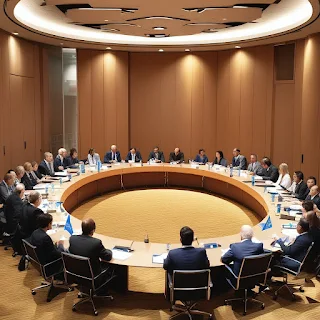(toc) #title= (Table of Content)
1. Definition of Foreign Policy
Foreign policy refers to the strategies and decisions adopted by a sovereign nation in its interactions with other countries, international organizations, and non-state actors. It encompasses diplomatic, economic, military, and cultural relations aimed at securing national interests, promoting economic growth, safeguarding security, and enhancing a country’s international standing.
In Africa, foreign policy is particularly crucial due to the continent's colonial legacy, strategic geopolitical location, abundant natural resources, and the need for economic development, regional integration, and peacebuilding.
2. Factors Influencing Foreign Policy in African Countries
Foreign policies are shaped by a variety of internal and external factors. These include:
A. Historical Legacy
- Many African states were colonies, and their post-independence foreign policies are influenced by former colonial ties (e.g., France-Africa relations).
- Pan-African ideals and the struggle against apartheid and imperialism have also shaped foreign policy narratives.
B. Political Leadership and Ideology
- Presidents and foreign ministers often determine the direction of foreign policy.
- For example, Julius Nyerere's policy of African socialism and Pan-Africanism influenced Tanzania’s international relations.
C. Economic Interests
- Countries prioritize trade, investment, and development aid.
- Resource-rich nations such as Nigeria and Angola use oil diplomacy, while others focus on tourism or agricultural exports.
D. Security and Stability
- Border conflicts, terrorism, and civil wars often drive foreign policy priorities.
- Nations may align with international coalitions (e.g., anti-terrorism coalitions in the Sahel).
E. Regional and International Organizations
- Membership in the African Union (AU), ECOWAS, SADC, and the United Nations influences foreign policy decisions.
- Obligations to regional peacekeeping and integration efforts are significant drivers.
F. Global Power Dynamics
- African countries often navigate relationships between competing global powers like the USA, China, Russia, and the EU.
- Non-alignment and South-South cooperation are also considerations.
G. Public Opinion and Diaspora Influence
- Citizens and diaspora communities play a growing role in shaping foreign policy through remittances, advocacy, and protests.
3. Foreign Policies of Selected African Countries
Below are case studies of how different African countries approach foreign policy:
A. Nigeria
Overview: Nigeria is Africa's most populous nation and an economic giant. Its foreign policy has traditionally focused on African solidarity and leadership in the continent.
Key Features:
- Afrocentric foreign policy: Prioritizes African unity and peace (e.g., peacekeeping in Liberia, Sierra Leone).
- ECOWAS leadership: Strong involvement in regional integration and conflict resolution.
- Oil diplomacy: Uses its oil wealth to engage with countries like China, India, and the US.
- Global aspirations: Nigeria seeks a permanent seat on the UN Security Council and increased global influence.
Challenges:
- Insecurity and terrorism (Boko Haram) affect its image and relations.
- Corruption and political instability have weakened its diplomatic leverage.
B. South Africa
Overview: Post-apartheid South Africa has pursued an assertive and inclusive foreign policy shaped by its democratic values and economic interests.
Key Features:
- Pan-African and global player: Strong involvement in AU, BRICS, and G20.
- Promotion of human rights and democracy: A legacy of its anti-apartheid struggle.
- Quiet diplomacy: Notably in Zimbabwe and other conflict zones, though sometimes criticized as ineffective.
- Economic diplomacy: Encourages trade and investment, particularly with China and the EU.
Challenges:
- Balancing relations between Western powers and emerging powers like China.
- Xenophobic violence and domestic economic struggles hurt its regional influence.
C. Kenya
Overview: Kenya’s foreign policy is pragmatic and development-driven, with a focus on regional leadership and international partnerships.
Key Features:
- Economic diplomacy: Promotes trade, tourism, and infrastructure development (e.g., through partnerships with China).
- Security cooperation: Active participant in counter-terrorism and AMISOM (African Union Mission in Somalia).
- Regional integration: Founding member of the East African Community (EAC).
- Environmental diplomacy: Hosts the UN Environment Programme headquarters in Nairobi.
Challenges:
- Terror threats from Al-Shabaab.
- Political instability during election cycles affects its image.
D. Ethiopia
Overview: Ethiopia has shifted from isolationism to regional activism, particularly in the Horn of Africa.
Key Features:
- Water diplomacy: Grand Ethiopian Renaissance Dam (GERD) project has driven intense foreign policy engagement with Egypt and Sudan.
- Peace diplomacy: Prime Minister Abiy Ahmed’s Nobel Peace Prize for resolving the Ethiopia-Eritrea conflict.
- Regional hegemony: As the seat of the African Union, Ethiopia hosts many diplomatic activities.
- Military assertiveness: Interventions in Somalia and conflict management in the Tigray region.
Challenges:
- Domestic ethnic conflicts and human rights issues.
- Disputes over GERD create diplomatic tensions with Nile Basin countries.
E. Rwanda
Overview: Rwanda, under President Paul Kagame, has pursued a visionary and assertive foreign policy focused on transformation and self-reliance.
Key Features:
- Branding Rwanda: Uses diplomacy to attract investment, conferences, and tourism (e.g., "Visit Rwanda" campaign).
- Military diplomacy: Deployed peacekeeping troops to Central Africa, Mozambique, and Haiti.
- Strategic partnerships: Balances relations with both Western donors and China.
- Digital and development diplomacy: Promotes innovation and ICT as a national image.
Challenges:
- Accusations of authoritarianism and intervention in DRC.
- Tense relations with some neighboring countries.
4. Conclusion
Foreign policy in African countries is a dynamic and multifaceted arena, influenced by historical, economic, political, and security factors. While each country crafts its foreign policy based on unique national interests, there are common trends across the continent: the pursuit of regional integration, economic growth, peace and security, and strategic global partnerships.
As Africa continues to evolve politically and economically, its foreign policy landscape is also maturing. New challenges such as climate change, cyber threats, and the influence of non-traditional actors are reshaping foreign policy priorities. African states must thus continue to adapt, assert their sovereignty, and pursue policies that reflect the aspirations of their people and their place in the global community.

Leave a comment behind